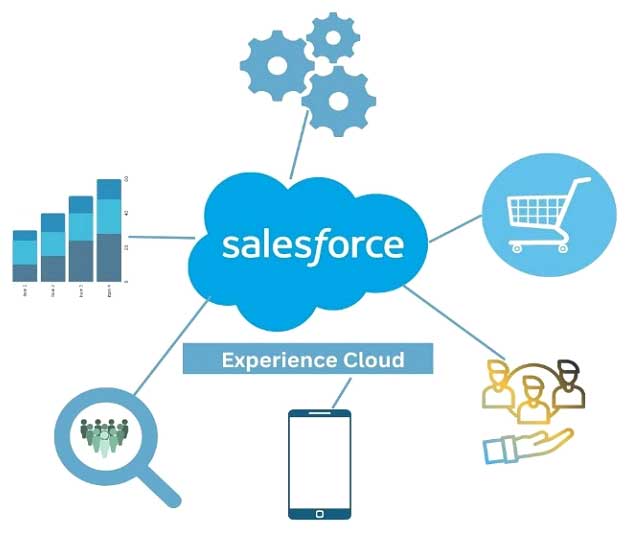Experience Cloud is a comprehensive software platform that combines a variety of digital marketing tools, services, and products to enable businesses to communicate with their consumers, modernize business processes, and connect with and collaborate with partners more efficiently. It is a flexible platform that offers all you require to plan, organize, set up, and control feature-rich digital experiences so that you may accomplish all your online goals.
All Salesforce tools and features, including sales, marketing, and customer service, as well as analytics, advertising, and content management, are combined under the Salesforce Experience Cloud. Several Salesforce communities that carry out various tasks and accomplish a variety of objectives can be built using Experience Cloud.

The software platform formerly known as Community Cloud is now renamed as Experience Cloud. Delivering a range of connected digital experiences:
Digital experiences on Experience Cloud
Customers expect to connect with businesses online simply and intuitively, and digital experiences are essential for organisations to survive. Customers are more likely to interact and act when a business offers a good digital experience. We created Experience Cloud after listening to our partners so that they could build safe websites, portals, and applications with linked data at every stage of the customer experience.
What aids in the transition to a proper digital transformation? There are three prerequisites, according to customers
Salesforce Experience Cloud features
Experience Cloud, formerly known as Community Cloud, contains several recent additions and updates, including:
Community Cloud vs. Experience Cloud
The capabilities of Experience Cloud are no longer restricted to community development. You can use it to develop a variety of digital experiences, such as branded websites, information-sharing portals, support centres, stores, B2B commerce sites, forums, and mobile applications that are specific to a certain community’s members and reside in the Salesforce org.
You may think of Experience Cloud as a progression from Community Cloud. To better represent its enormous potential and expertise in creating distinctive Salesforce digital experiences that fulfil customer requests, the software platform formerly known as Community Cloud has been renamed Experience Cloud.
Salesforce Experience Cloud licenses
Community user licenses are used for access to Experience Cloud sites. Selecting the license is one of the first steps you must take when building an Experience Cloud site. Different Salesforce objects and features are accessible under different Experience Cloud licenses, and data is configured in various ways.
Customer Community
Anything that entails exchanging data and working as a team. Since the Partner Community is now offered at a comparable price, this option is no longer as useful for organisations.
Partner Community
Partner Relationship Management is a term that is occasionally used. anywhere where the opportunity data must be seen by partners and suppliers.
Channel Account
It’s advantageous for many points of engagement with various employees from the same partner because you may have up to 40 users per accounts.
External Apps
This is aimed at folks who wish to build custom apps using the Salesforce platform.
Benefits of Salesforce Experience Cloud
Let’s look at the advantages you’ll experience when you integrate the tool with Salesforce.



